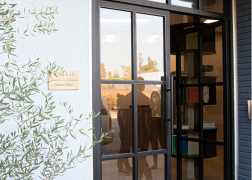What inspired you to join Sollis?
I was inspired by the idea of treating patients in the acute setting while providing comprehensive individualized care. There have been many times where I felt I wanted to be able to dedicate more time with each patient during their moment of need; working at Sollis allows for that.How does it feel to help someone with a chronic condition by diagnosing them and getting them the right treatment? Conversely, what does it feel like if you have trouble pinpointing the root of an issue?
There is a great sense of accomplishment when you are able to successfully guide someone in their path of healing. Finding a solution for someone that improves quality of life and minimizes suffering always feels like a win. Conversely, it is unsettling when I am unable to pinpoint the cause of a patient’s condition; there is a feeling of an unfinished puzzle needing to be completed.Do you have any personal connection to chronic or invisible illness—either firsthand or via a loved one?
I have family members with chronic diseases: one aunt currently living with sickle-cell anemia, another aunt who unfortunately passed from ovarian cancer.“A chronic condition may be a part of you, but it doesn’t have to define who you are…unless you want it to!”

What are the ways Sollis helps people who are struggling with a chronic condition?
Sollis offers the tools and expertise to help patients navigate the health system. We are aware that medical care is complex, and it can be overwhelming for patients to obtain care while dealing with an illness.What about people who don’t have access to Sollis? How can they best advocate for themselves, especially in an emergency room?
For people who don’t have access to Sollis, having access to your physician or primary care team is paramount. Providing care is more seamless when able to speak with clinicians who are already familiar with the patient and case. During regular appointments, clarify ways the patient or another clinician can get in contact with the primary care team or physician when needed.As someone who’s constantly talking to patients, can you speak a little about the most effective language they can use with their providers? What else can they do to help communicate—bring photos, journal entries, etc?
Providing pertinent documentation or information that may help guide care is extremely helpful. Giving too much information is better than withholding information. Also, providing contact information for any other providers involved in the care helps support a collaborative environment, especially when dealing with more chronic issues.“It is unsettling when I am unable to pinpoint the cause of a patient’s condition; there is a feeling of an unfinished puzzle needing to be completed.”








